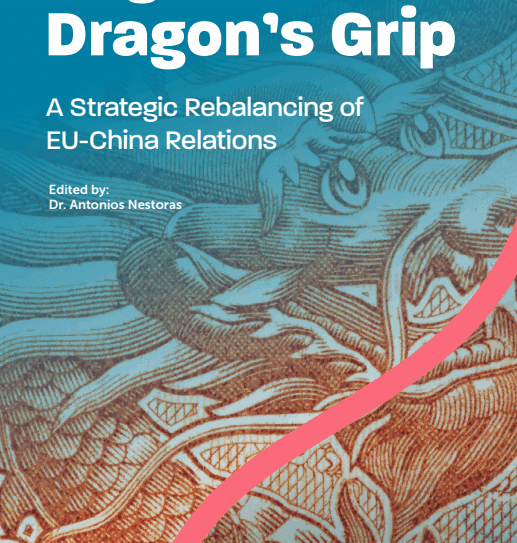Beyond the Dragon’s Grip
Europe’s long-term prosperity and security rely on acting autonomously. While China is a vital partner for trade, technology, and investment, overdependence on a single source can undermine the EU’s resilience.

Europe’s long-term prosperity and security rely on acting autonomously. While China is a vital partner for trade, technology, and investment, overdependence on a single source can undermine the EU’s resilience.

Edited by: Dr. Antonios Nestoras
Europe’s long-term prosperity and security depend on its capacity to act with autonomy. China is a key economic partner and an essential actor in technology, trade, and industry. The relationship brings clear benefits, from investment to innovation. At the same time, excessive reliance on single source can weaken the Union’s capacity to respond in times of pressure.
This study highlights the sectors where Europe’s dependencies are most significant, sets out key priorities for action, and recommends measures to bring trade, industrial, and security policy into closer alignment.
The goal is to equip the European Union with the means to act decisively and with confidence. By strengthening its capabilities, broadening its partnerships, and enhancing institutional coordination, the EU can safeguard its interests, preserve openness, and lead with greater sovereignty.
This publication is the outcome of the Innovation Policy Lab, a joint undertaking between the European Liberal Forum (ELF) and the Friedrich Naumann Foundation for Freedom Europe (FNF Europe). It represents a culmination of collaborative efforts, discussions, and expert insights aimed at addressing the multifaceted challenges confronting Europe. The ELF–FNF Policy Labs brought together a diverse group of policymakers, academics, practitioners, and civil society representatives from across Europe.
This dynamic gathering fostered an environment conducive to in-depth analysis, debate, and creative thinking. The participants, each bringing their unique perspectives and expertise, played a crucial role in shaping the discussions and formulating the policy recommendations presented in this book.
It is important to note that not all chapters in this publication were developed solely through this conference. While the majority of the content is derived from the Policy Labs, some chapters were influenced by additional research, expert consultations, and policy discussions. These contributions were integrated to provide a comprehensive and well-rounded set of policy proposals.